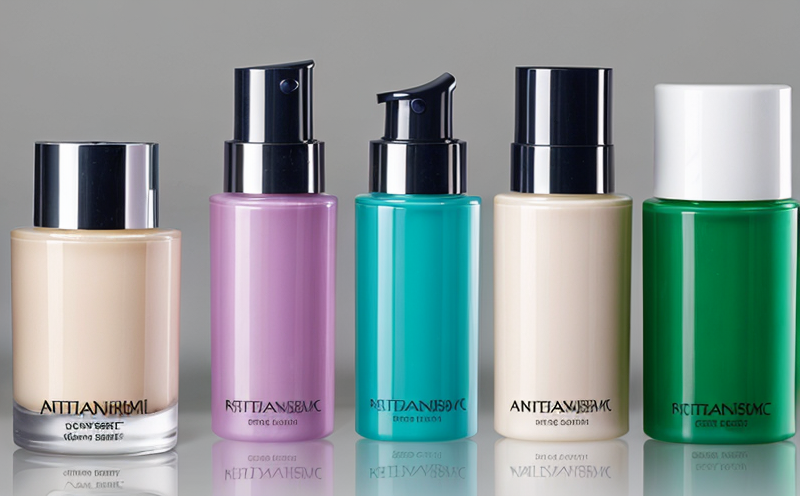Preservative Efficacy Testing in Water-Based Cosmetic Products
In the highly regulated world of cosmetics and personal care products, ensuring product safety is paramount. Among the critical factors in maintaining product stability are preservatives that inhibit microbial growth and extend shelf life. This service focuses on the testing of preservative efficacy in water-based cosmetic products to ensure they meet stringent regulatory standards.
The use of preservatives in cosmetics has been a subject of extensive scrutiny due to concerns over potential allergens, irritants, or dermatological effects. However, it is equally important that these preservatives do not compromise the product’s sensory attributes such as texture, appearance, and odor.
Water-based cosmetic products are particularly challenging for preservative efficacy testing because they provide an ideal environment for microbial growth due to their high water content. This makes them vulnerable to contamination from various sources including raw materials, equipment, packaging, and the end-user’s hands. The challenge lies in ensuring that a chosen preservative effectively controls microorganisms without affecting product quality.
The testing process is complex and involves multiple steps to simulate real-world conditions under which the product might be used or stored. This includes assessing the preservative's ability to inhibit growth of common pathogens such as bacteria, yeast, and mold. The test also evaluates whether the preservative can maintain its effectiveness over time and through various environmental stressors.
The methodology typically involves inoculating a water-based cosmetic product with known microorganisms at specific concentrations. The product is then incubated under controlled conditions to observe any growth or changes in microbial populations. Comparative testing against a control sample without preservative can provide insights into the efficacy of the chosen preservative.
Advanced analytical techniques such as high-performance liquid chromatography (HPLC), Fourier-transform infrared spectroscopy (FTIR), and microbiological assays are employed to monitor the chemical composition, microbial activity, and overall stability of the product. This ensures that the testing process is both precise and reproducible.
The results of these tests provide critical data for quality managers and compliance officers responsible for ensuring product safety and regulatory compliance. R&D engineers can use this information to refine formulations and select optimal preservatives. Procurement professionals benefit from this service as it helps in selecting reliable suppliers who adhere to stringent quality standards.
The importance of this testing cannot be overstated, especially given the increasing demand for natural and organic products that may require different approaches to microbial control. By adhering to international standards like ISO 22716:2011, this service ensures that cosmetic products not only meet but exceed regulatory requirements.
In summary, preservative efficacy testing in water-based cosmetic products is a cornerstone of ensuring product safety and maintaining consumer trust. It involves rigorous laboratory procedures aimed at safeguarding the integrity of cosmetic formulations while preserving their sensory qualities.
Scope and Methodology
The scope of this service includes comprehensive testing to evaluate the preservative efficacy in water-based cosmetic products. This encompasses a wide range of formulations such as lotions, creams, gels, and sprays that are primarily aqueous or contain significant amounts of water.
The methodology involves several key steps to ensure accurate and reliable results:
- Sample Preparation: Careful preparation of the cosmetic samples is crucial. This includes ensuring homogeneity, avoiding contamination, and maintaining the integrity of the product.
- Inoculation: Known microorganisms are introduced into the sample at controlled concentrations to simulate real-world conditions.
- Incubation: The samples are incubated under specific temperature and humidity conditions to observe microbial growth or inhibition over time.
- Analysis: Various analytical techniques are employed to assess the preservative’s effectiveness. These include microbiological assays, chemical analysis, and sensory evaluation.
The results of these tests are meticulously documented and reported in compliance with international standards such as ISO 22716:2011 and ASTM D4839-05.
Industry Applications
This service finds significant application across the cosmetics industry, particularly in ensuring that water-based products meet stringent hygiene standards. It is vital for manufacturers looking to launch new product lines or reformulate existing ones.
For quality managers, this testing ensures consistency and reliability of preservative efficacy over time. Compliance officers benefit from it by staying ahead of regulatory changes and requirements. R&D engineers use the insights gained from these tests to innovate and develop safer, more effective formulations. Procurement professionals leverage this service to select reliable suppliers who adhere to high-quality standards.
Moreover, as consumer preferences shift towards natural and organic products, understanding preservative efficacy becomes even more critical. This testing helps companies navigate the complexities of formulating safe yet effective products that align with evolving market demands.
Competitive Advantage and Market Impact
The success of a cosmetic product heavily depends on its shelf life, safety, and overall quality. By offering preservative efficacy testing in water-based cosmetic products, this service provides a significant competitive advantage to clients:
- Regulatory Compliance: Ensures that all formulations meet or exceed international standards.
- Consumer Trust: Builds confidence among consumers who are increasingly concerned about product safety and quality.
- Innovation: Facilitates the development of safer, more effective products that can withstand various environmental conditions.
- Risk Mitigation: Helps identify potential risks early in the product lifecycle, reducing the likelihood of post-market recalls.
In a highly competitive market, these advantages translate into enhanced brand reputation and increased consumer loyalty. The ability to provide safe and effective products can significantly impact market share and long-term business success.





